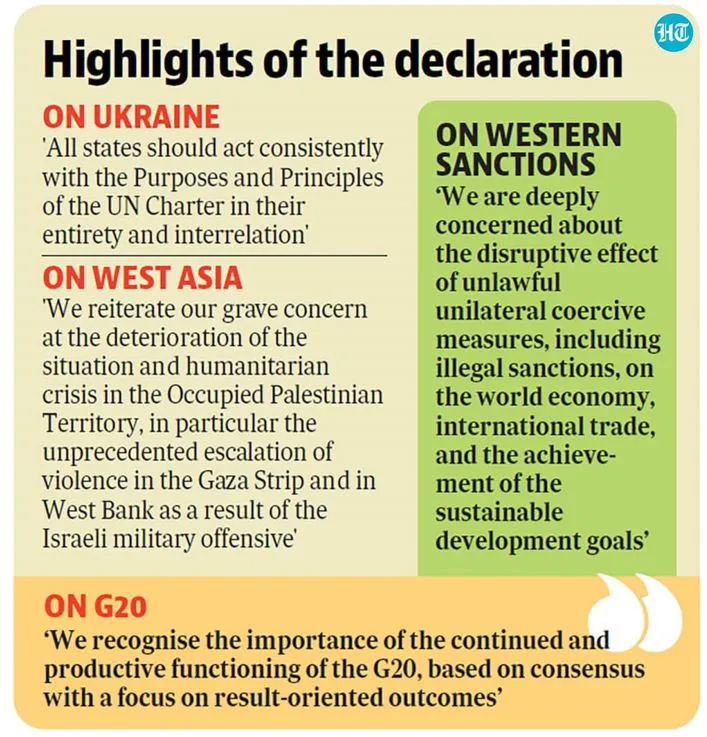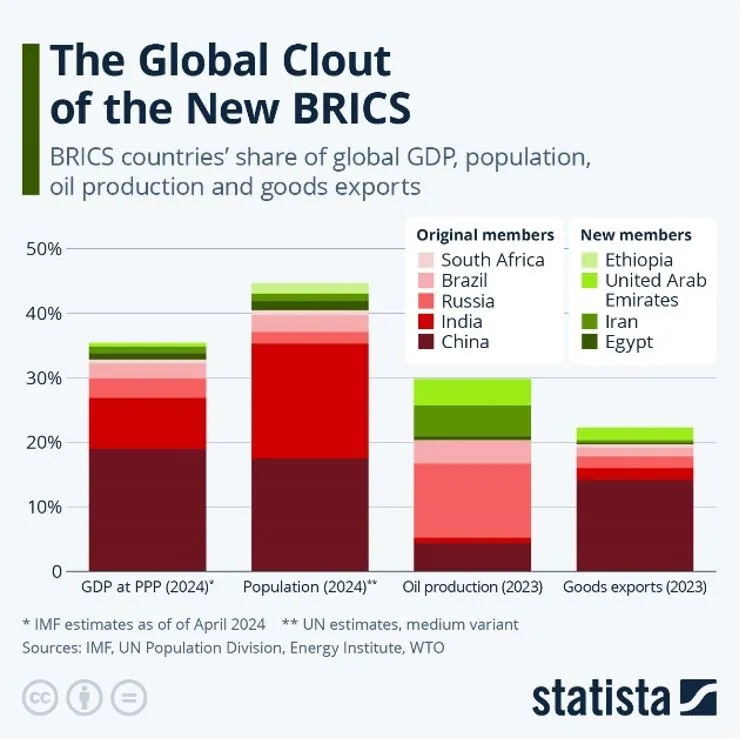

24th October 2024 (10 Topics)
Context
The 16th BRICS Summit concluded with the adoption of the ‘Kazan Declaration’, a comprehensive document outlining key areas of cooperation and the bloc's unified stance on global issues.
Key Outcomes of the Kazan Declaration
Under the theme "Strengthening Multilateralism for Just Global Development and Security", the Kazan Declaration emphasised the importance of BRICS solidarity and strategic partnerships. The leaders pledged their commitment to fostering peace, ensuring a fairer international order, and promoting sustainable development. The key-outcomes are as follow:
- Geopolitical Concerns
- Diplomatic Resolutions for International Conflicts: The summit highlighted the critical need for peaceful resolutions to international conflicts through diplomacy. The declaration underscored the importance of adhering to the United Nations Charter, particularly in relation to the ongoing Ukraine conflict. Leaders expressed appreciation for mediation efforts aimed at facilitating dialogue and resolving the conflict peacefully.
- Concerns Over Palestine: The situation in Palestine was a focal point of concern, with the declaration noting the severe humanitarian crisis in the Occupied Palestinian Territory. The BRICS leaders voiced their grave apprehension regarding the escalation of violence in Gaza and the West Bank, calling for immediate measures to alleviate the situation.
- Middle East Crisis: The declaration also addressed the escalating humanitarian crisis in the Middle East, particularly in Southern Lebanon. Leaders condemned the civilian casualties and damage to infrastructure resulting from military actions, urging for a cessation of hostilities.
- Global Governance and Multilateralism
- Role of the G20: The importance of the G20 in global decision-making processes was emphasized. The leaders recognized the necessity for the G20 to function effectively, advocating for a consensus-driven approach focused on achieving tangible outcomes.
- Reform of Financial Architecture: The BRICS nations reiterated their commitment to reforming the international financial architecture to enhance global governance. They called for a more agile and representative multilateral system capable of addressing financial challenges, stressing the need for reforms that promote inclusive growth.
- Innovative Financial Practices: The declaration encouraged the exploration of new financial practices, highlighting the BRICS Interbank Cooperation Mechanism (ICM) as a means to facilitate innovative financial solutions. The leaders reaffirmed their support for a robust International Monetary Fund (IMF), emphasizing the need for a quota-based and adequately resourced financial safety net.

- Economic Cooperation and Local Currencies
- Strengthening Trade in Local Currencies: A significant aspect of the summit was the agreement to enhance trade and financial settlements in local currencies. The declaration welcomed initiatives aimed at utilizing local currencies for BRICS financial transactions and establishing independent cross-border settlement infrastructures.
- BRICS Grain Exchange: The leaders endorsed the initiative to create a BRICS Grain Exchange, which would facilitate commodities trading within the bloc. This move is seen as a step towards greater economic integration among member nations.
- Expansion of BRICS: Recognizing the growing interest from nations in the Global South, the leaders established a BRICS Partner Country category. New members, including Egypt, Ethiopia, Iran, Saudi Arabia, and the UAE, are welcomed to join the bloc, indicating a commitment to expanding BRICS influence and partnerships.
- Pandemic Preparedness and Environmental Conservation
- Health Initiatives: The summit highlighted the necessity of strengthening health systems through collaborative efforts. Leaders supported initiatives related to vaccine research and development, early warning systems for infectious diseases, and the establishment of a BRICS TB Research Network.
- Addressing Antimicrobial Resistance: The Kazan Declaration acknowledged the threat posed by antimicrobial resistance (AMR), welcoming the outcomes of the UNGA High-Level Meeting on AMR.
- Conservation of Big Cats: India's initiative for an International Big Cats Alliance received recognition, with BRICS countries pledging to collaborate on the conservation of endangered species. This highlights the bloc’s commitment to environmental sustainability.
Fact Box: What is BRICS?
|



